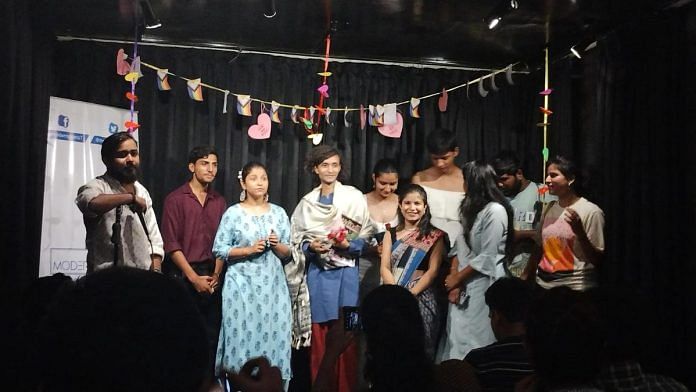Coming-out stories’ are more than just declarations of identity, they are complex histories of queer lives. In Families We Choose: Lesbians, Gays, Kinship, anthropologist Kath Weston refers to these stories as narratives of gender and sexuality which take the form of cultural performances to explain one’s queerness to others and to oneself. These stories do more than just help one ‘come out’ as part of the LGBTQIA+ community, they reveal certain truths about families, societies and laws governing us. These were the stories told at the Pride version of the storytelling show Chali Kahani organised by The Modern Poets, a collective that organises and curates open mic events.
From losing a friend from the community to a love story cut short by a forced marriage, personal tales coloured with queerness, carrying social realities of stigma, were narrated with admirable sincerity and a lot of humour. The fluid boundaries between the personal and the political of queer existence became even more blurry, maybe even inseparable at the event.
Among those performing were veterans of Delhi’s spoken word circles such as Alankrita Mishra and Harshit Singh, while others were newer entries like Eeva and Janvi Tyagi. Some were queer, some were not. Some were there to talk about their own lives, others shared stories of queer people who had touched their lives.
Harshit, who helped curate the event, said that the idea for it stemmed from a stereotyping of the queer community at mainstream gatherings. He recalled how he was asked to share his “tragic” coming out story at a show by one of the largest storytelling collectives.
“I refused to perform for them. That day I realised there was a lack of our stories in the world, on the stage. We too have love stories, stories about friendship, and families. We want to tell those stories,” he said.
Also Read: An old Delhi heritage walk that’s not about Jama Masjid, Red Fort. It tells queer histories
Finding humour
Two themes— family and trauma— tied these storytellers and their stories together. Lived experiences that one would expect to hear about in therapy were being discussed, through poetry, music, stand–up, in front of an audience of strangers with a kind of candour shared among friends over a tea break.
Eeva, a trans woman, told the story of her conservative Muslim family who took her to a group of medical professionals where she was called a “transbomber”.
She ended her set with the lines — “Hamari satrangi ishq ka jo baarish hai, uska koi din yaa saal nahi hota. Uska zamaana hota hai (The rains of our rainbow-coloured love don’t last a day or a year. They are evergreen.)” It was clear that the ishq she was referring to wasn’t just romantic love. Satrangi ishq is the enduring love within the community and its allies, born out of shared experiences of discrimination, hardship, resilience as well as empathy for each other.
Sarvagya Soni, a trans man, recounted when his ex-girlfriend told him that he wasn’t a “real man”. He responded by calling himself an AI “TransGPT”, which elicited amused chuckles from the audience.
These storytellers challenged the perception of the ever-suffering queer community. They discarded pity and shame by finding power and hilarity in their experiences.
Those who identified as cis and straight also spoke of their found families from within the community.
After shifting to Mumbai, Parnika Vishnoi spiralled into depression and anxiety. When she had given up hope of ever finding joy in the city, she befriended a trans woman on the street. She spoke about how she didn’t just make a friend, she found someone who would challenge her, change her perception of the world. She recalled how her friend bought a red saree for her when she shied away from buying one because she wasn’t married. “It doesn’t matter if you are married, doesn’t matter if you are a girl, it doesn’t matter. If you like something, you can do it, you can keep it. That’s your right,” she said.
Even after Parnika moved back to Delhi, she does not spend a single day without talking to her friend in Mumbai.
Also Read: Queer entrepreneurs are claiming a new public place — Indian malls
Demands for justice
Not all stories, however, had such happy endings. The reality of social and legal marginalisation of queer people was inescapable.
Alankrita, the first performer of the day, wove a story of friendship, recognition and sorrow while talking about Arpit, the first gay man she knew. He was a close friend who was in love with the man she was dating. Despite the sense of competition, the two had formed an irreplaceable bond, she said. Barely holding back tears, she told the audience of his passing which was preceded by harassment and online bullying. “All his dreams are mine now, I walk around spreading colours trying to fulfill his dreams. I only want to speak of his story, of his story only I speak,” she recited.
Demands for change were not just implicit. People used the stage to voice their desire for social justice and legal amendments. Among them was co-curator Harshit Singh. He pitched the need for same-sex marriage using his own story as an example. He recalled how an ex-boyfriend who he shared dreams of raising children with dumped him to marry a girl to prevent his mother from committing suicide. “If we had our family’s support, then everything would be much easier. Same-sex marriage rights are as important as human rights,” he said.
This is not the first queer storytelling event that he has been a part of. He hosted India’s first trans storytelling show, The Third, in Delhi on 16 April.
“We’ve lived two lives, lived many stories and learnt a lot. It’s important to talk about it, that’s why the stage is here,” said Harshit.
(Edited by Theres Sudeep)



